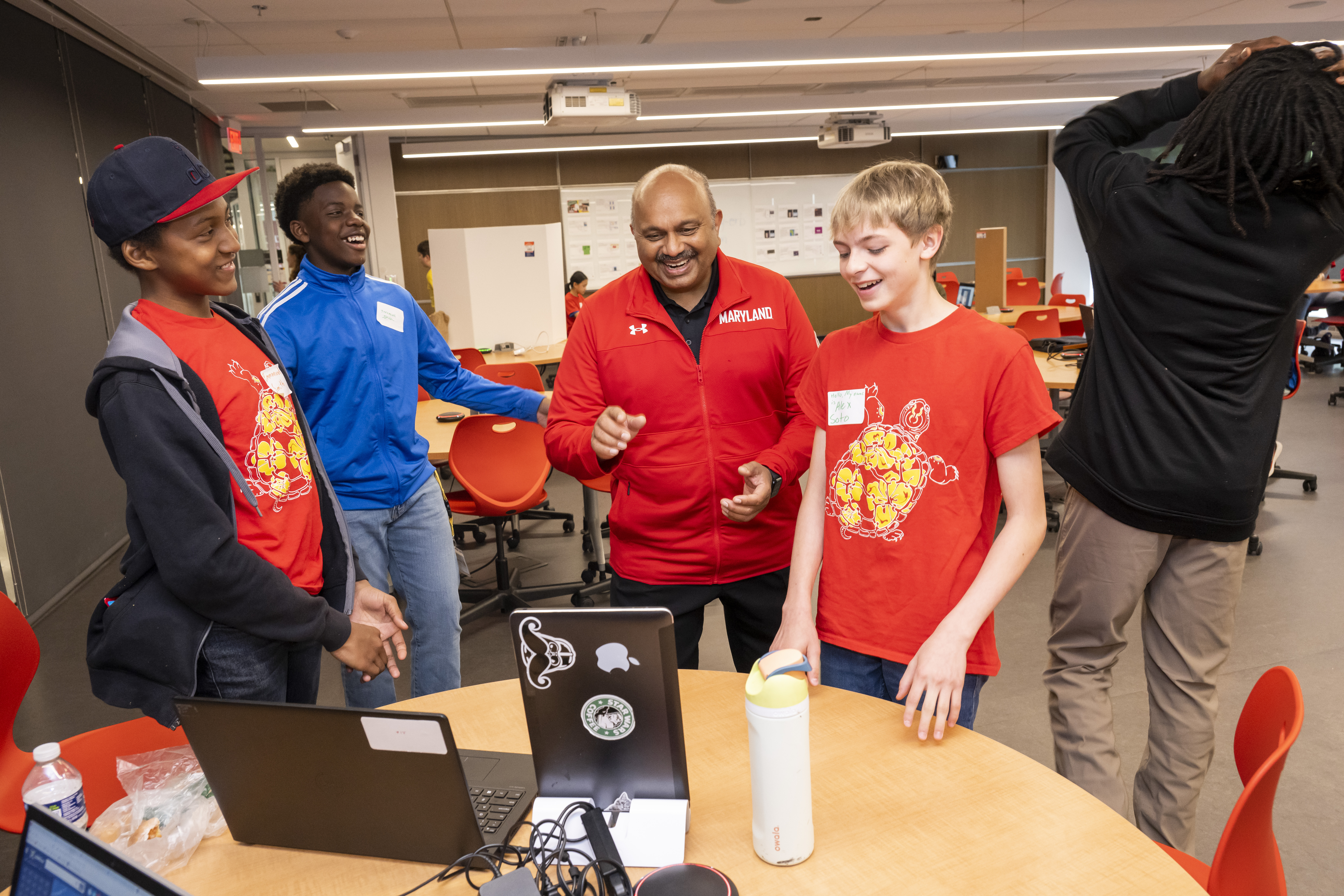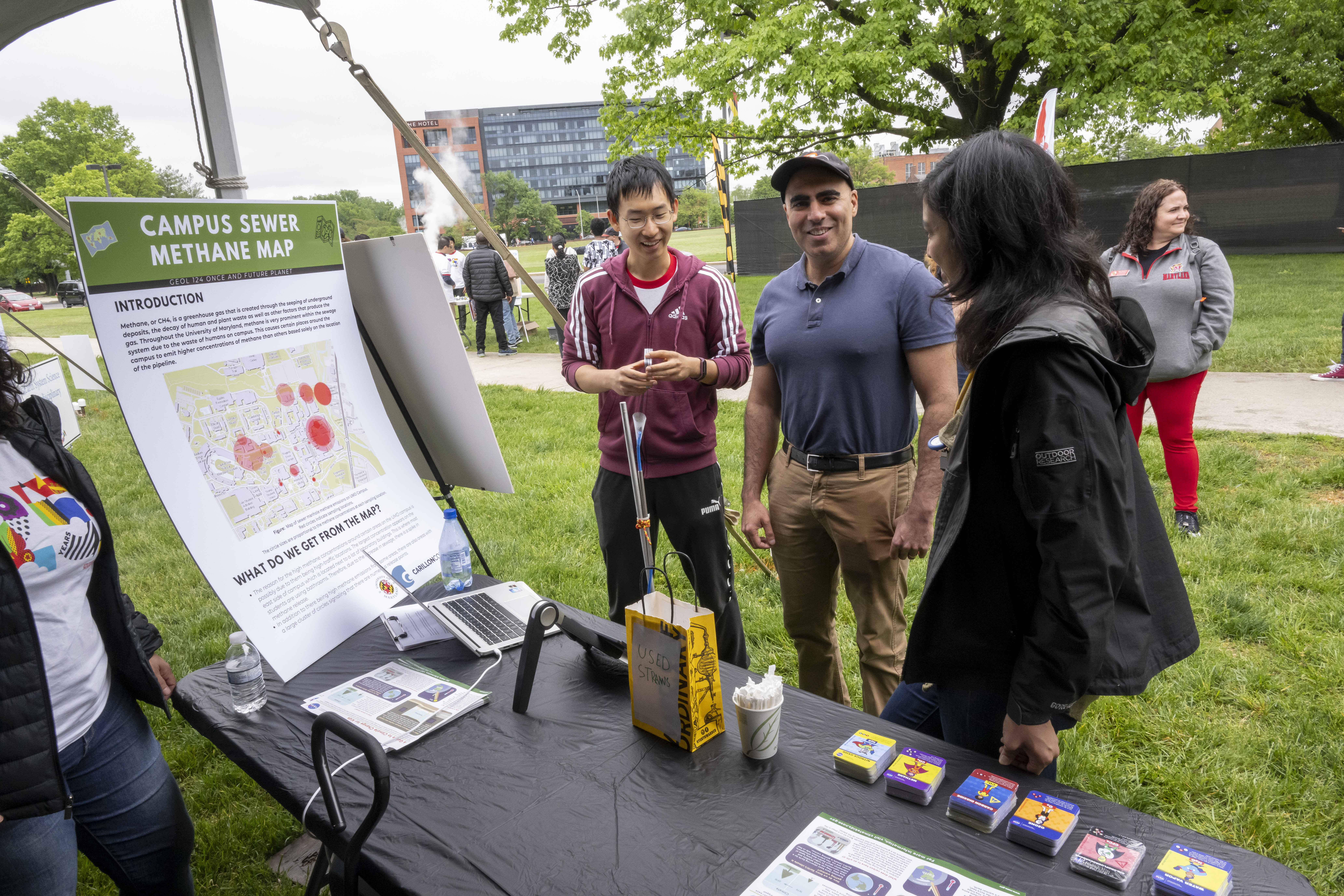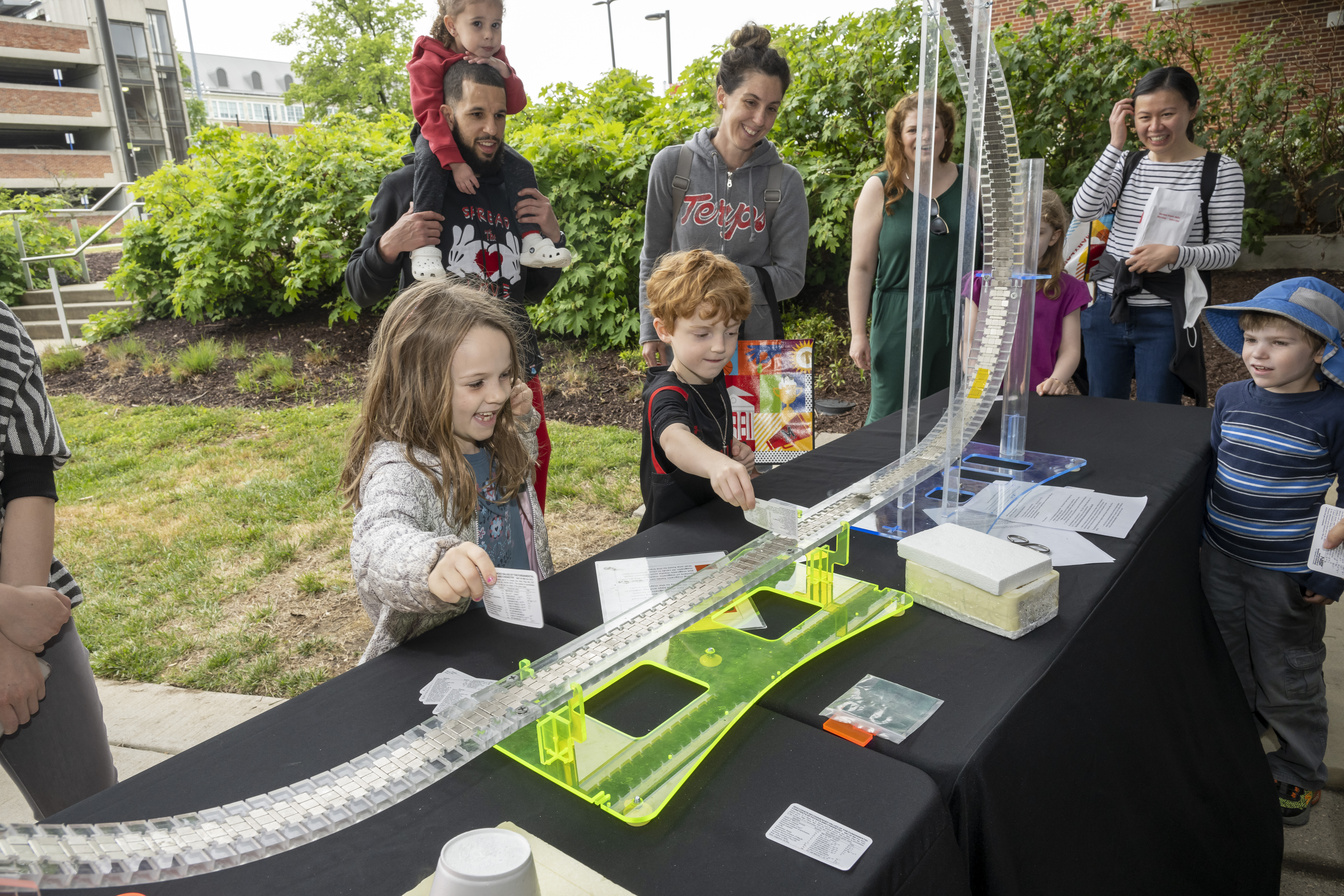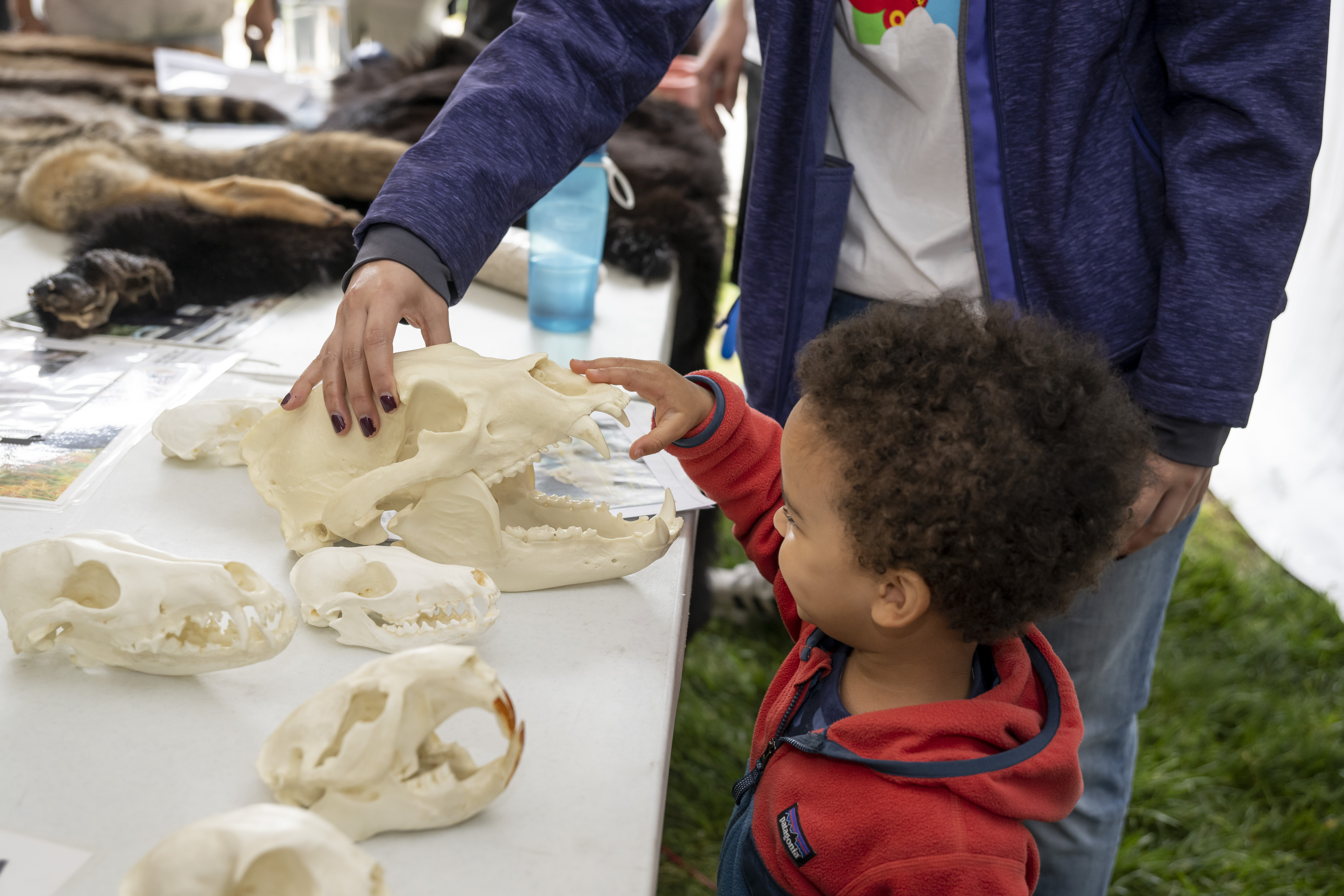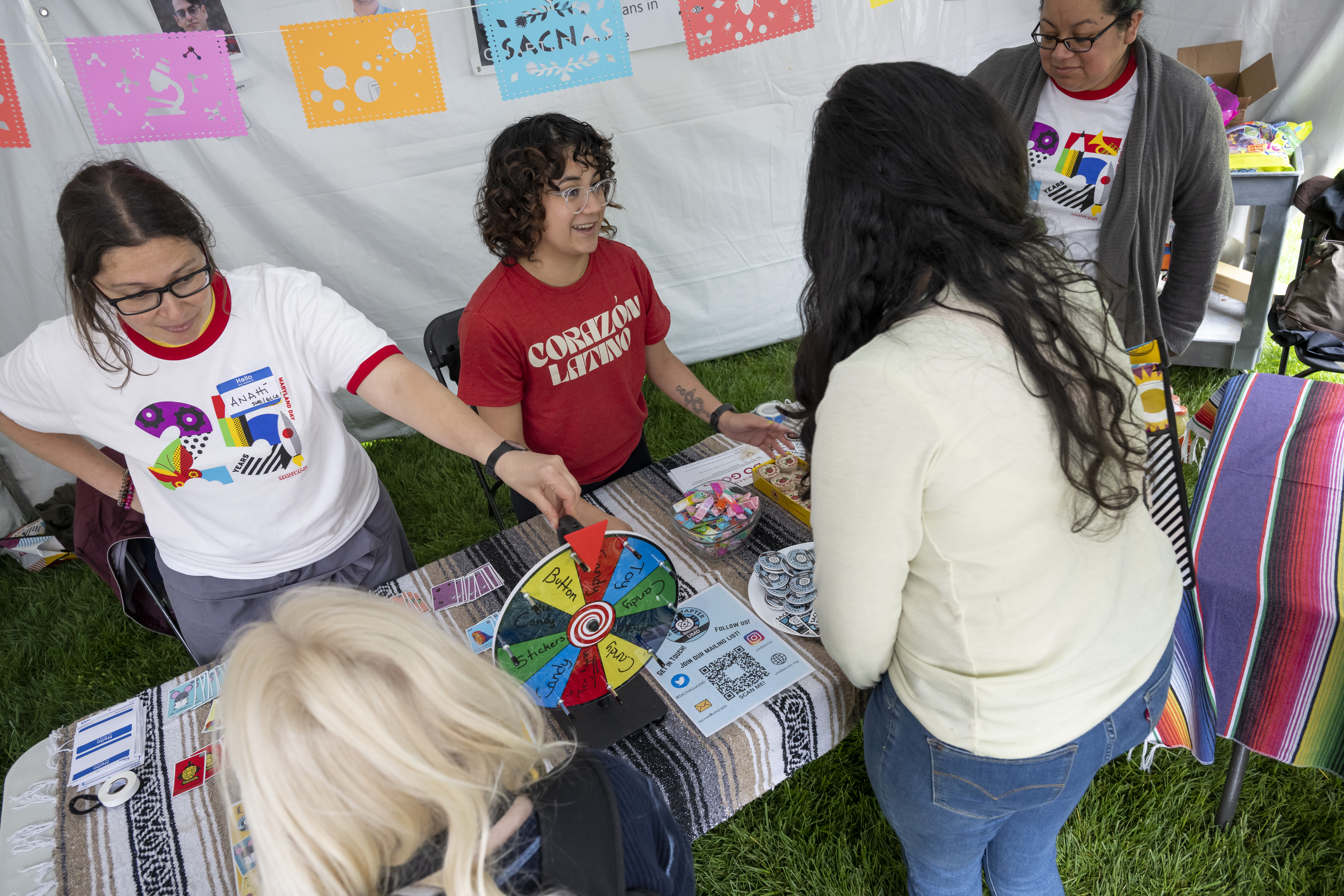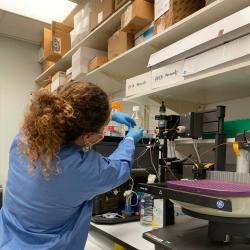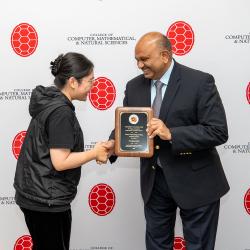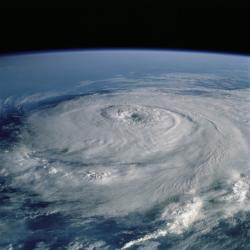Join Our College for Maryland Day on Saturday, April 27
The College of Computer, Mathematical, and Natural Sciences will host 48 events.
Explore our world of innovation and learning on Maryland Day! Maryland Day is an opportunity for prospective students and community members to learn more about the University of Maryland—and find out how the College of Computer, Mathematical, and Natural Sciences is reimagining teaching and learning to prepare the next generation of scientific leaders for success.
Unlock a world of learning, discovery and exploration, with hundreds of family-friendly festivities including exhibits, workshops, hands-on demonstrations, performances, cross-campus tours, lectures, petting zoos and athletic events.
Maryland Day will be held on Saturday, April 27, 2024, from 10 a.m. to 4 p.m., rain or shine. Admission and parking are free—see this campus map. Join CMNS on Science & Tech Way for the 48 events listed below!
Brendan Iribe Center for Computer Science and Engineering
-
Batteryless Computing – Room 3245
-
Are you tired of charging your devices and changing batteries? Tour a research lab that makes devices batteryless and glimpse the future: sustainable smart cities that run forever.
-
-
Break Through Tech – Room 1202
-
Meet members of a national program working at the intersection of academia and industry to propel women and underrepresented communities into technology. Learn more about how you can join this inclusive community as a student, mentor or industry partner.
-
-
Codeathon Corner – Room 2207
-
Visit representatives from the information science major for a mini coding challenge suitable for beginners interested in computing.
-
-
CompSciConnect and SECURE IT – Rooms 1116, 1108 and 1207
-
Join UMD CompSciConnect and SECURE IT student summer campers from across the state as they showcase their computing skills in programming robotics, app development, web design, cybersecurity and 3D game design. Stop by to participate in demos and engage with projects.
-
-
Discover the Next Big Startup – Room 2237
-
The Mokhtarzada Hatchery is an innovative incubator that provides students with the resources to turn their entrepreneurial visions into reality. Meet student founders and see demos of their latest projects, from data-centric AI to machine learning algorithms. Learn how the Hatchery helps Terps secure funding, develop prototypes and take their ideas to market.
-
-
Immersive Media Design: Projection, Virtual Reality and Augmented Reality – Room 0110
-
Experience student and faculty interactive pieces in the IMD lab. The Immersive Media Design major fuses students' artistic talents with technical skills and computer science.
-
-
Interested in Computer Science? – Room 1132
-
Learn more about the computer science major in a 50-minute information session from academic advisers with an opportunity for a Q&A session with current students.
-
-
Onbody Robots and Relocatable Wearables – Room 0102
-
See how students and faculty in computer science advance interactive technologies by designing, prototyping and evaluating novel artifacts. Demos in the Small Artifacts Lab include on-body robots and relocatable wearables, an interface that helps assist blind users design websites. and visualizations using handheld projectors.
-
-
Robotic Assistive Feeding – Room 0116
-
Stop by the Robotics Manipulator Lab to see how students and faculty in computer science develop assistive robotics technologies, such as to feed individuals with disabilities.
-
-
UMD’s Coed Technology Fraternity – Room 4105
-
Meet members of Kappa Theta Pi, UMD’s first and only coed technology fraternity. Learn about how they develop members technically, professionally and socially to prepare them for life after college.
-
-
XR Club: Virtual and Augmented Reality – Room 2107
-
Have you ever wanted to step into an immersive virtual world? Play games like Beat Saber and Mario Kart VR and learn about the activities of the XR Club.
-
Chemistry Building
-
Alka-Seltzer Lava Lamps – Front lawn
-
Watch students' homemade mini lava lamps come to life after adding a tablet of Alka-Seltzer.
-
-
Build a Molecule with Legos – Front lawn
-
Learn about atoms and molecules using Lego bricks.
-
-
Dry Ice Bubbles – Front lawn
-
Catch a bubble with your own hands from bubbles made from dry ice.
-
-
Red Cabbage Juice Indicator – Front lawn
-
Conduct an experiment with red cabbage juice, a natural indicator, and use it to test the pH of different solutions.
-
-
Thermochromic Slime – Front lawn
-
Play with slime that changes color at different temperatures.
-
-
UV Color-Changing Bracelets – Front lawn
-
Make a bracelet with beads that change color in the sun.
-
Geology Building
-
Earth's Fury: Understanding Earthquakes and Volcanoes – Front lawn
-
Volcanic eruptions and earthquakes remind us how dangerous living on a constantly changing planet is. See demonstrations that explain what occurs during these dramatic events.
-
-
Earthquake Cycle and the Cryosphere – Front lawn
-
Learn about tectonic plate movement and earthquake cycles; observe a shake table that simulates ground motion; design an earthquake-safe structure and test whether it can survive an earthquake; and learn about albedo and measuring surface temperatures.
-
-
Meteorites ... and Meteorwrongs – Front lawn
-
Only four meteorites have been found in Maryland. Can you tell the difference between Earth and space rocks? Find out how!
-
-
Minerals and the Earth: The Stuff of Life – Room 2118
-
See and touch pieces of a planet's insides. These minerals, rocks and gems are the raw materials of life.
-
-
Moonquakes and Marsquakes – Front lawn
-
Create your own "moonquakes" and discover how NASA and UMD are helping to prepare astronauts to explore rocky worlds. Learn about the tools that Apollo astronauts used on the moon's surface and those we may send with astronauts headed there this decade.
-
-
Volcanoes! – Front lawn
-
Learn about the inner workings of volcanoes and the forces that lead to their eruptions. Do you have what it takes to be a volcanologist? Test your skills by learning to identify crystals in samples of pumice and ash from an explosive eruption of Cerro Machin in Colombia.
-
-
Water in the Earth – Front lawn
-
How is water cycled beneath the Earth's surface? What impact does this have on us? Learn about how much water is present in different Earth materials, and participate in a water-related craft that you can take home.
-
Glenn L. Martin Hall
-
Ask an Astronomer – Front lawn
-
Faculty and students answer your perplexing astronomy-related questions.
-
-
Bites and Bytes – Front lawn
-
Learn how microbes, nutrition and computers contribute to gut health. Stop by for activities related to the human microbiome and computational analyses of microbiome data.
-
-
Earth System Science and Climate Change – Front lawn
-
Explore our planet with scientists from the university, NASA and the National Oceanic and Atmospheric Administration. Enjoy educational and entertaining Earth science-themed activities: How much water can you squeeze from a cloud? How can virtual reality help us learn about lightning and flash-flood safety?
-
-
Fingerprinting the Universe – Front lawn
-
Each person has a unique fingerprint. So does each chemical element in our bodies and the universe itself, encoded in light. Learn how astronomers study the skies using different wavelengths of light and how they decode the light to unravel the mysteries of the universe.
-
-
Fun with Waves! – Front lawn
-
Take part in hands-on experiments demonstrating the fundamental principles of electromagnetic, acoustic and mechanical waves.
-
-
Looking Into the Cosmos – Front lawn
-
Join AstroTerps, the Terrapin Astronomy Society, to explore the familiar and not-so-familiar sights of the universe. How many can you identify?
-
-
Maryland's Weather and Climate – Front lawn
-
Learn about Maryland's weather and how the materials we use to build cities make where we live hotter, and play with a tornado in a bottle.
-
-
Our Neighbor, NASA Goddard – Front lawn
-
Around the corner and around the galaxy: NASA's Goddard Space Flight Center, five miles away in Greenbelt, builds spacecraft and instruments and invents technology to study Earth, the sun, the solar system and universe. Discover how its mission affects you.
-
-
Paleoclimate CoLaboratory – Front lawn
-
Learn from scientists and students studying ancient climates how we put present-day climate change into a longer-term context. Can you find the lucky cats in the isotope lab?
-
-
Puzzles and Brain Teasers – Front lawn
-
Play with puzzles and other brain teasers brought to you by UMD's math wizards.
-
-
Solar Observing – Front lawn
-
Take a safe look at the big, bright, yellow (or red, depending on the filter) ball in our sky through telescopes with Astronomy Observatory staff.
-
Hornbake Plaza
-
Maryland Wildlife Quest
-
Explore the wildlife of Maryland and contribute to a Chesapeake Bay and Appalachian Mountains mural.
-
-
Plants Get Diseases Too!
-
Take a tour of diseases that can make plants sick and learn to recognize infected plants.
-
-
Who’s That Scientist?
-
Play a game with UMD's chapter of the Society for Advancement of Chicanos/Hispanics and Native Americans in Science to learn about prominent Chicano/Hispanic and Native American scientists around the world and at UMD.
-
John S. Toll Physics Building
-
Liquid Nitrogen Ice Cream – Front lawn
-
Bet you haven't had ice cream like this! This homemade specialty tastes great and is safe for all ages. Try it, while supplies last.
-
-
Physics Demos Film Festival – Room 1410
-
Enjoy a selection of physics demonstration videos produced by faculty, staff and students.
-
-
Physics Is Phun – Front lawn
-
Students and faculty from the Department of Physics share fantastic demonstrations that explore and explain some of the amazing principles and concepts of the universe.
-
Physical Sciences Complex
-
Can You Move Like a Cell? – Outside
-
Skin cells that move collectively are better at healing wounds, and immune cells that work together are better at detecting and eliminating infections. "Move like a cell" in games like follow-the-leader while a camera tracks you, or check out the new acoustic levitation demonstration.
-
-
Radar Velocity – Outside
-
Test your throwing ability at the Radar Velocity Detector Station.
-
-
Smoke Cannons – Outside
-
Two cannons make for amazing motion when rings collide.
-
-
Think Quantum: Magnetic Levitation – Outside
-
See levitating superconductors, cooled by liquid nitrogen, zoom along a magnetic track.
-
Physics Welding Shop
-
Vortex Makerspace
-
Find fun, hands-on activities at the Department of Physics' makerspace, which encourages learning, investigation and collaboration through practical projects in electronics, fabrication, coding and more.
-
Plant Sciences Building
-
Discover a Swamp – First Floor Hallway
-
Capture and observe small aquatic creatures common to nearby wetlands and learn about their behavior as they swim through water and climb on plants.
-
-
Insect Petting Zoo – First Floor Hallway
-
Imagine tarantulas, exotic insects, scorpions, bees and millipedes longer than your hand for you to look at and touch—if you dare.
-



